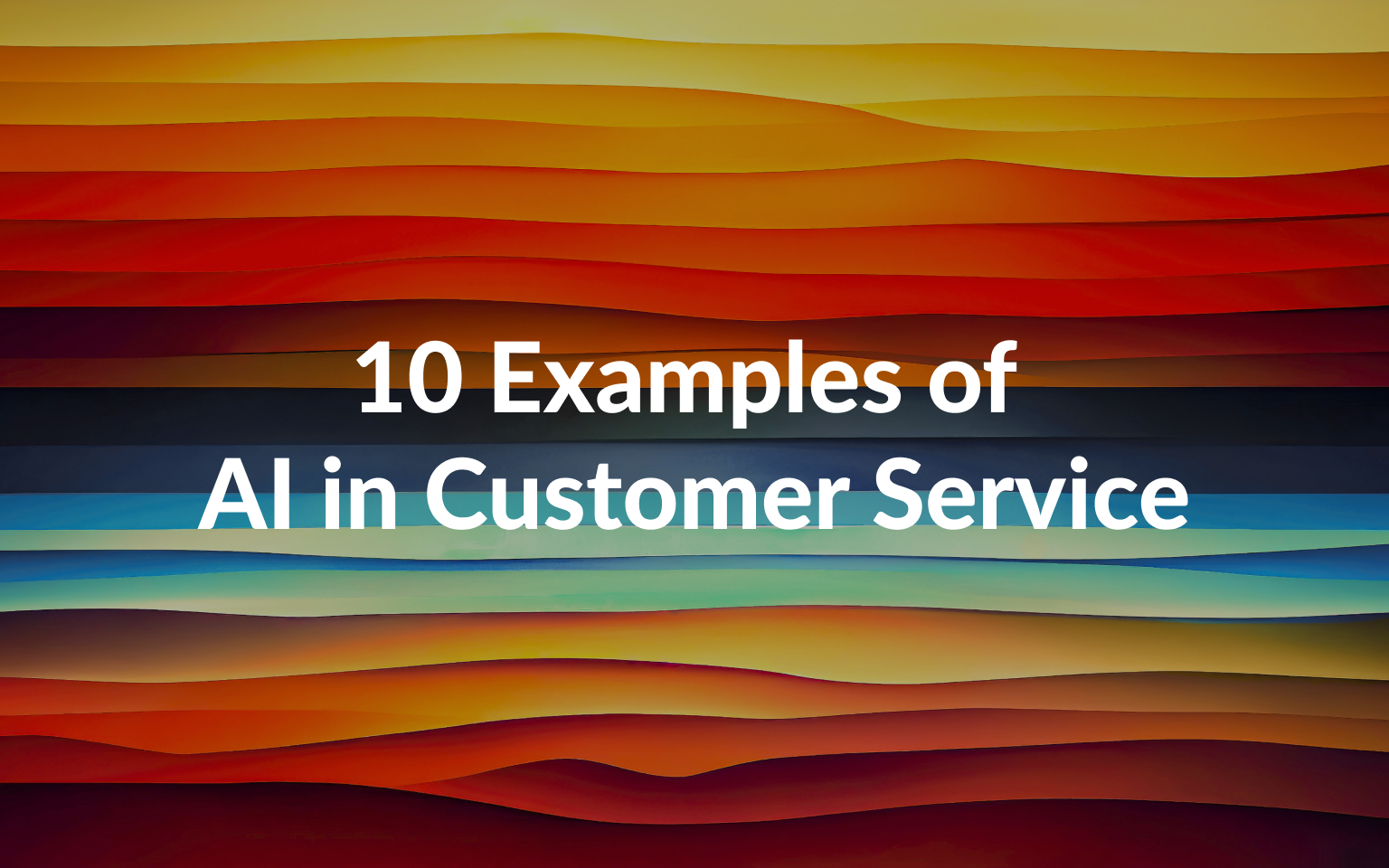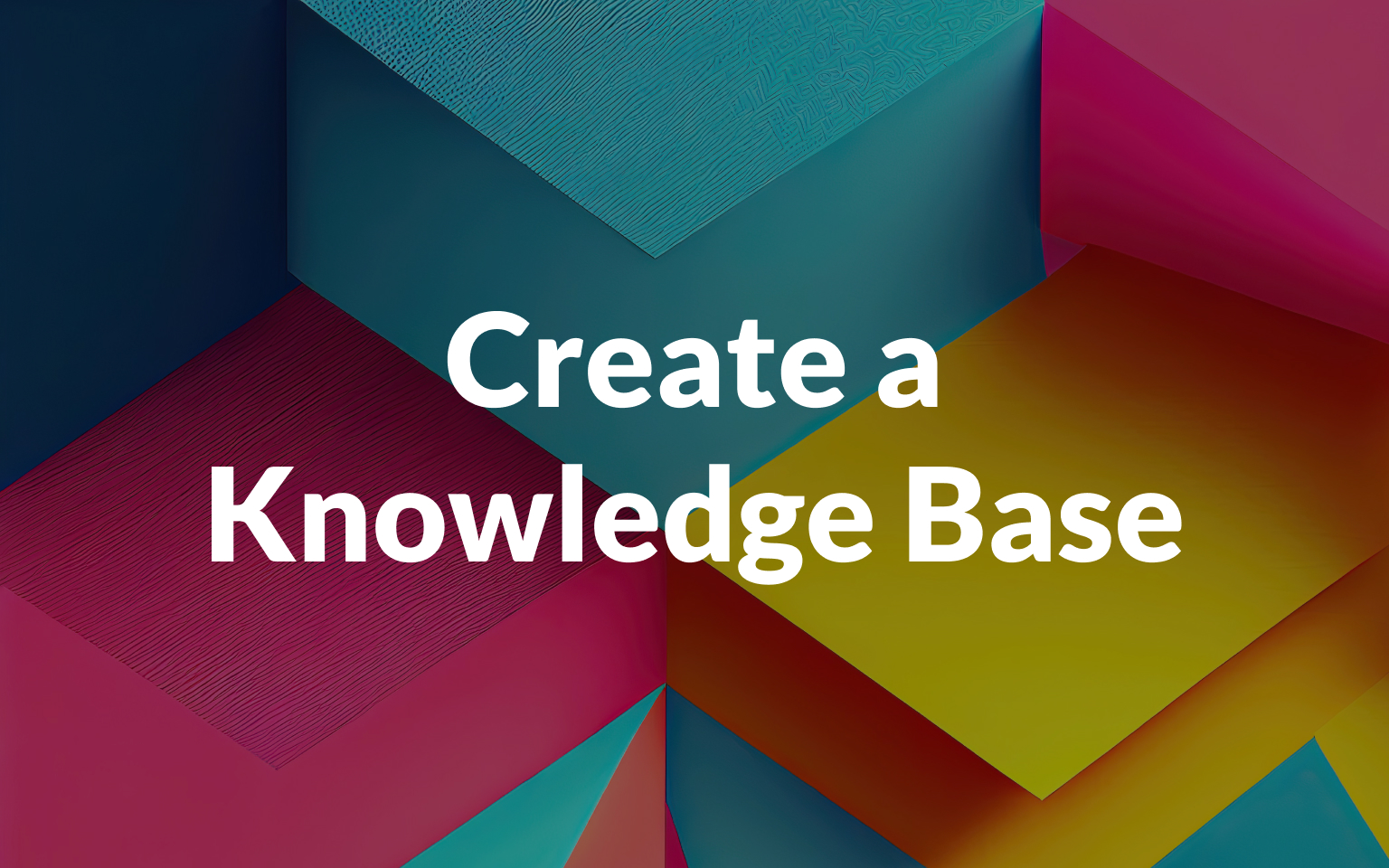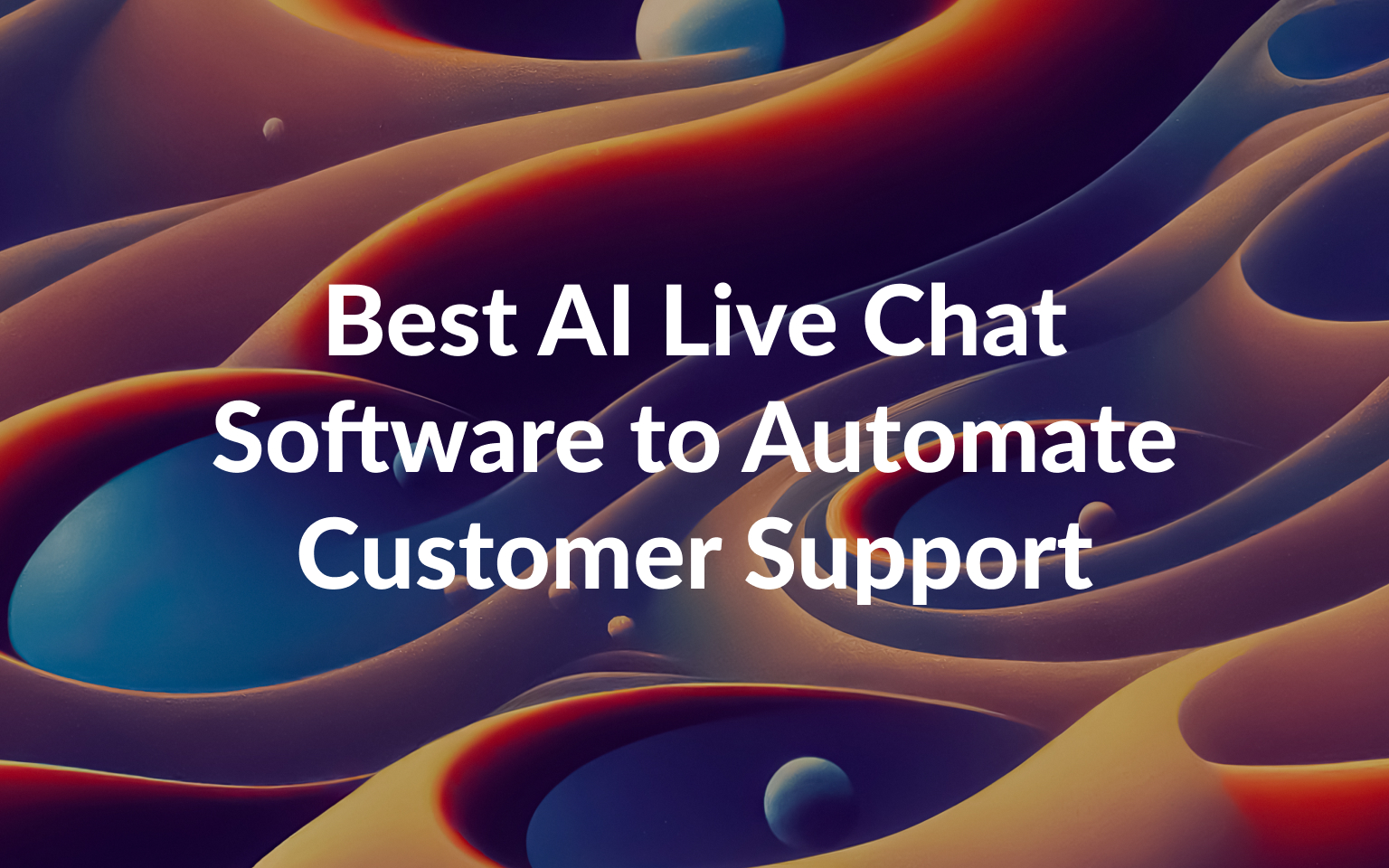

10 Examples of AI in Customer Service

If you’ve been looking at ways to make wholesale improvements to your customer service, chances are you’ve been inundated with suggestions to make the switch to AI.
However, it’s understandable to be a bit skeptical whenever something is this hyped. Is it just a buzzword? Can it really do what everyone says it can? Are there any actual examples of how it’s helped customer service teams reach or exceed their KPIs?
Well, we’re here to put all your burning questions to rest. AI is not just the future, it’s the here and now as well. Below, you’ll see some of the top 10 ways that AI is already changing the way businesses deliver exceptional customer service.
Quick note: If you haven’t gone deep into the AI rabbit hole before, you can take a catch-up course by reading our AI in customer service guide.
AI Chatbots
The biggest benefactors from the rise of conversational AI are AI-powered customer service chatbots.
These bots are becoming increasingly good at simulating natural conversations, blurring the lines between them, and interacting with an actual human agent. Compared to today’s chatbots, their rule-based, limitedly capable ancestors from just a couple of years ago look basically prehistoric.
These rule-based bots could deliver limited responses by following strict, predefined scripts or specific sets of questions. Traditional chatbots are keywords-based and they do not always understand a customer’s intent resulting in customer frustration.
They were also highly limited in adapting their language to fit the context of the conversation or to respond to customer emotions in dynamic, live chat situations.
Modern AIs, on the other hand, are highly adaptable, being able to learn on the fly and go “off-script,” so to speak, to provide more natural and contextually-aware responses.
Now, they can handle routine (and even some more complex) queries with ease instead of just guiding users through a predetermined path. Plus, they can scour company knowledge bases and documentation in a fraction of the time it would take a human to provide quick answers.
And, if it all gets a little bit too much, AI chatbots can always escalate issues to a support team member.
Of all the examples in this article, AI live chat arguably has the most benefits to offer customer service teams:
- 24/7 Availability: Chatbots have no downtime and can operate freely outside of business hours, delivering consistent support access at any time.
- Cost efficiency: Automating common inquiries reduces the need for additional human resources.
- Customer satisfaction: Faster response times, immediate resolutions to FAQs boost, and intelligent routing boost the average customer experience.
- Scalability: Chatbots aren’t impacted by changes in ticket volumes, operating just as well at peak times as low points.
🚀 Elevate Support with AI-Powered Chatbots
Customerly Aura automates 60% of support queries, reducing response times and keeping customers satisfied—effortlessly.Conversational AI
With the recent advancements in technologies like Generative AI like ChatGPT and Large Language Models (LLMs), the age of truly conversational AI has arrived! Now, virtually everyone has access to AI with highly generalized capabilities that can engage in a natural, human-like dialogue.
Conversational AI in customer service goes beyond the basic decision-tree chatbots of the past which can deliver a limited range of responses from a limited range of queries based on their rule-based programming. Instead, they can respond to almost any intelligible human query with a reasonable response.
As we’ll see below, while using conversational AI in customer-facing chatbots is their obvious application, they permeate all aspects of modern, AI-powered customer service.
Thanks to its ability to:
- Understand context
- Identify user intent
- Generate nuanced responses
Conversational AI not only improves the user experience but reduces the need for human intervention on repetitive or simple tasks.
Virtual Assistants
It’s not only your customers that can benefit from interacting with AI, but your agents as well.
Now, every member of your customer support team can have an AI-powered personal assistant, helping them handle customer interactions in real time. Acting as a support system, they can aid agents by:
- Providing immediate access to information from your FAQs, KBs, past interactions, etc.
- Suggesting responses based on the customer profile and input.
Integrating this capability right into the agent’s dashboard and chat windows, makes the experience seamless, boosting metrics like Time to Resolution, Average Handle Time, CSAT, and more.
The bottom line is that it improves both the speed and quality of your agent’s performance by synergizing the best of AI-driven and real human support.
24/7 Self-service and AI Knowledge bases
While AI is supercharging direct support channels, like chatbots and agent customer service, two-thirds of consumers prefer to try helping themselves first.
That means that your self-help resources have to be on point. Both to avoid leaving your customers frustrated at not being able to find a solution and to keep your ticket volumes low.
Once again, AI offers multiple angles of attack to improve your self-service experience:
- Analysis tools to find content gaps or identify new topics based on customer inquiries and trends.
- Generative AI tools to draft, outline, write, edit, or improve knowledge base articles.
- Advanced search tools to help customers hone in on the information they need faster.
- AI-powered knowledge bases that integrate with chatbots to improve canned responses.
Whether it’s your internal documentation, FAQs, wikis, video tutorials, KB articles, or saved customer interactions, AI can make your content count.
Predictive Analytics
We’re with you. Probably one of the most annoying parts of customer service is analyzing all your historical data and past interactions to find useful patterns.
Yet, you can only keep improving your service quality by following a proactive, data-driven approach.
Luckily, AI is amazing at analyzing huge amounts of data and generating easy-to-digest trends, insights, and behavioral patterns. From a big-picture perspective, this allows you to optimize your marketing campaigns, resource allocations, and service offerings.
At a more individual level, you can stop being reactive by anticipating customer needs and preparing for them ahead of time; whether it’s preparing new self-service resources, offering personalized experiences, or recommending relevant products.
Plus, you can quickly identify customers at key moments, such as when they’re ready to convert or at risk of leaving.
Automatic Ticket Creation, Routing, and Prioritization
We don’t need to tell you that traditional ticketing methods tend to be inefficient, creating serious bottlenecks. Typically, designated agents manually had to sort and prioritize incoming requests based on a quick scan, a process that’s highly susceptible to errors and delays.
AI integration, on the other hand, can automatically generate tickets for customers based on chatbot interactions. By analyzing keywords, urgency, and sentiment, it can label and prioritize messages to route them to the most appropriate agents.
Not only does this help ease the initial bottleneck, but it also means you’ll need to do less client handovers between agents down the road.
This greatly streamlines the entire process for both your agents and customers, making sure that your customer service is a well-oiled machine.
🎯 Smart Ticketing, Zero Hassle
Automate ticket assignment and prioritization with Customerly AI, ensuring faster resolutions and a streamlined workflow.Feedback and Sentiment Analysis
As NLP evolves, AIs are getting better at not only analyzing customer data points and context but also gauging their emotions and intent. With improved sentiment analysis, AIs now tell whether a customer is likely happy, frustrated, or somewhere in between based on their language.
This allows chatbots to proactively nip potential issues in the bud when customers near certain thresholds. Depending on the situation, they can either take action to prevent escalations or immediately escalate tickets to an agent.
On the flip side, AIs using machine learning can scan through customer reviews, surveys, CSATs, and social media to identify trends or common pain points. This allows customer service teams to stay ahead of customer needs and adjust their service quality quickly.
Hyper-Personalized Support
AI enables hyper-personalized customer support by using machine learning to analyze customer behavior, preferences, and past interactions.
By processing data like shopping history and inquiry patterns, for example, AI personalization tools can make tailored product recommendations or offer solutions in real-time.
This same information can be used to dynamically provide agents with optimal strategies or responses when engaging with customers. Some tools even offer a complete breakdown of a customer’s past interaction timeline to reference right in the support dashboard.
With 76% of customers expecting personalization, it’s a must-have to boost customer satisfaction.
Multilingual Support
AI helps customer service teams seamlessly provide multilingual support by automatically detecting and translating customer messages in real-time.
While it’s for nuance to get lost in translations, today’s tools can preserve context and emotion across translations to ensure that your responses adequately meet your customers’ expectations.
All of this, without any significant delays or leaving your support software.
This is especially important for larger companies whose audiences are becoming increasingly global. Now, companies aren’t reliant on satellite offices with extra manpower working in different time zones to offer international support with a local flavor.
Automated Emails Responses
Using the same conversational and generative capabilities, AI systems can automate email responses and outreach campaigns.
These tools can continually refine and improve their output by leveraging NLP and ML to analyze customer emails. For more control, companies can create standardized templates that AI can pre-fill using ticket or company database information to generate personalized emails.
Plus, with AI widgets integrated into helpdesks, agents can respond faster, ensuring consistency and accuracy in customer communication. All of this saves customer service teams a lot of time while helping to manage the risk of errors and boosting agent productivity.
Success cases of companies using AI in customer service
AI is no longer a future ideal but well and truly here. In fact, some companies have been using it to improve their services for longer than you’d expect!
Netflix is one of the most successful examples of using AI and ML to provide curated content recommendations that catch customers’ attention and keep them coming back for more. Combined with A/B testing, it allows them to make custom recommendations at a scale and accuracy that would be impossible using manual analytics.
Humana, an international insurance provider, collaborated with IBM Watson Health to deploy AI-powered virtual assistants. It helped them improve customer experiences for over 1.3 million medical members. This conversational AI tool streamlines benefits inquiries, provides personalized cost estimates, and assists agents with accurate, quick responses.
TeamSystem Fatture in Cloud, a leading Italian invoicing platform, integrated AI-powered chatbots to elevate its customer service. By adopting Customerly’s AI solutions—Aura, AI Intents, and AI Mission—they automated 60% of customer support queries, delivering responses in just 15 seconds and boosting customer satisfaction by 20%.
These are just some real-life examples of how AI is making customer service faster, smarter, and more personalized. The future of AI in customer service will undoubtedly involve more companies using AIs in more ways to improve the experiences for more of their customers.
From automating responses to offering hyper-personalized support, with AI’s continuous evolution, the possibilities for enhancing customer satisfaction are endless! 🤯
At Customerly, we strongly believe in the potential of AI to enhance the customer experience, boost agent productivity, and help you scale elegantly as your business grows. Check Customerly’s comprehensive suite of AI-powered services and tools to help you stay ahead of the curve.





